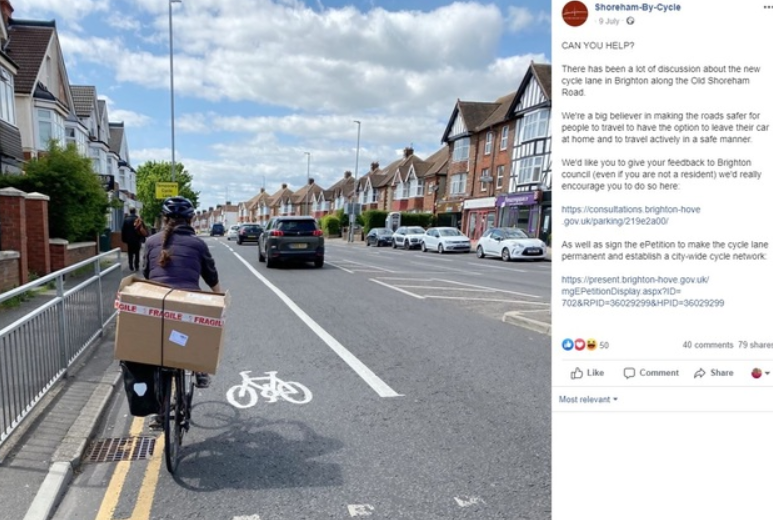New rules will require people signing petitions to the council to provide their postcode as evidence that they live, work or study in Brighton and Hove.

The proposal to tighten up the rules follows claims in the past year that some petitions have been hijacked by campaigners from outside the area.
One of the most controversial examples came after a temporary cycle lane was created along a stretch of Old Shoreham Road, Hove.
The cycle lane replaced one lane of the dual carriageway in each direction after a big drop in the number of cars and vans on the road during the first coronavirus lockdown.
Petitions for and against the cycle lane attracted thousands of signatures but those opposed to the changes claimed that campaigners had asked cycling groups elsewhere to drum up online support.
At a Brighton and Hove City Council meeting at Hove Town Hall yesterday (Thursday 13 May), members of the Policy and Resources Committee backed the tighter rules.
They will now go before the full council at a meeting next Thursday (20 May).
If the rule change is agreed, people who start or sign a paper petition or an online petition on the council website would be required to provide their postcode.
Those starting petitions on websites such as Change.org or 38 Degrees will be encouraged to show that signatories live, work or study in Brighton and Hove.
Conservative leader Steve Bell said: “If someone does not demonstrate they live here, will that nullify the whole petition?
“Or will you just strike out those people who are not providing the full information so they will not count as a signatory?”
The council’s executive lead officer for strategy, governance and law, Abraham Ghebre-Ghiorghis, suggested a “pragmatic approach” – ignoring signatures without a postcode. He said that striking out a whole petition would be “harsh”.

The move was a compromise to continue allowing petitions from external platforms, he said, adding: “If we were to block them immediately, it would be a shock. So the proposal is a compromise.
“There will be an expectation that postcodes will be displayed. Once we have a familiarity and we get used to that, we will make it mandatory. The proposal is a halfway house, between a free-for-all and a rejection.”
The rules require petitions to be related to council business and permit them to be submitted to a meeting of the full council or the relevant committee.
Petitioners are asked to inform the council of petitions submitted on paper or through an external website at least 10 working days before the relevant council meeting.
If more than 1,250 signatures are collected, the petition can be debated by the full council for up to 15 minutes – with a lead petitioner allowed to address councillors for three minutes.
Mr Ghebre-Ghiorghis said that the “compromise” proposals would give people time to become familiar with the new system before the council introduced a hard requirement for a postcode.









The council ignore petitions anyway. So what difference will a made up postcode make?
But they do take notice if they support what the council wants to happen.
Remember the “Keep A270 Cycle Lane extension” started by Bricycles, and we look forward to finally seeing the results of the biased pro-cycling anti-motorist consultation that ended in February 🙁
It wasn’t ‘claimed’ that pro cycling groups signed the petition it was proved with Chris Williams admitting he had encouraged them via twitter and social media. It totally distorted the petition process.